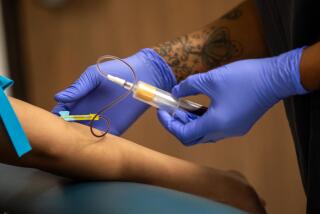Couples Rush to Wed, Avoid Test for AIDS
- Share via
SPRINGFIELD, Ill. — County clerks across Illinois reported a year-end rush to get marriage licenses--the result of a law that took effect Friday requiring AIDS tests for couples applying for the licenses.
“Since Christmas, we’ve issued about 100 licenses when normally it would be about 25,” Janice Delaney, St. Clair County clerk, said in Belleville.
“They’re trying to beat the new AIDS testing law, not so much because of the test results but because of the costs,” she said.
From now on, before county clerks can give a marriage license, couples must provide a certificate signed by a licensed physician proving that the test was administered, said Dr. Bernard J. Turnock, the state’s health director.
Identities Protected
“Couples will not be required to provide results of their tests to the county clerk,” Turnock added. Doctors must report positive results to public health officials but are prohibited from identifying patients by name.
The Illinois State Medical Society advises that laboratory testing could cost each person as much as $30 to $50.
The tests must be done within 30 days of applying for a marriage license, and from office visit to final results, the process may take from three days to three weeks.
Health officials estimate that less than 1%--or 80 to 400 people among the 200,000 Illinois residents taking the premarital tests each year--are expected to develop AIDS.
The new law, passed by the Legislature last session, does not prevent couples from marrying if either person tests positive.
Louisiana Has Law
Linda Haase, spokeswoman for the Illinois Department of Public Health, said only one other state--Louisiana--has a premarital AIDS testing law. The Louisiana law also took effect Friday.
Acquired immune deficiency syndrome cripples the body’s defenses against disease, leaving a person prey to life-threatening infections and certain cancers. The syndrome is incurable and fatal, and the virus that causes it is spread mainly through sexual intercourse or shared hypodermic needles.
Testing positive means a person has been exposed to the virus, but it does not necessarily mean the person will develop AIDS.
More to Read
Sign up for Essential California
The most important California stories and recommendations in your inbox every morning.
You may occasionally receive promotional content from the Los Angeles Times.












